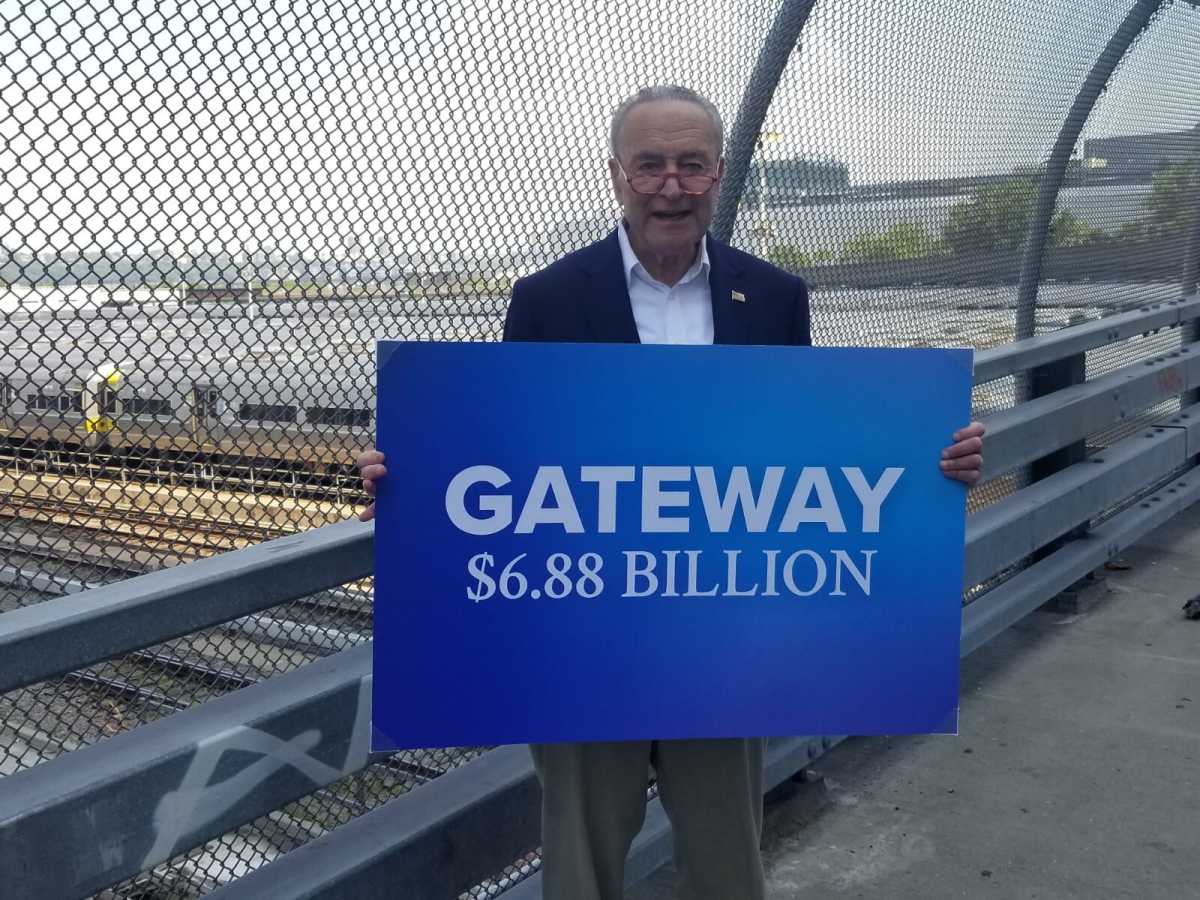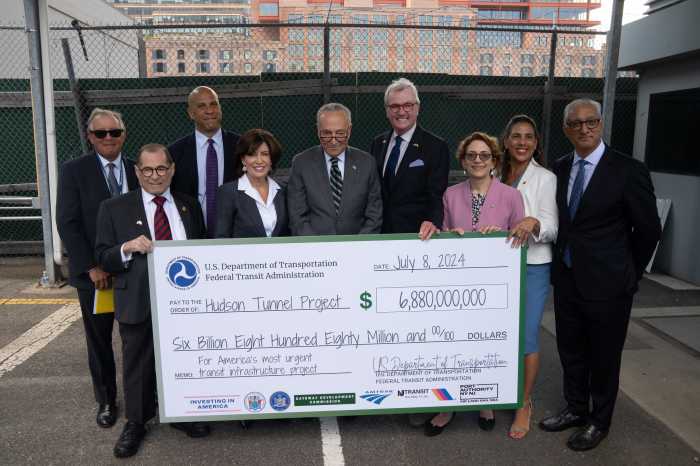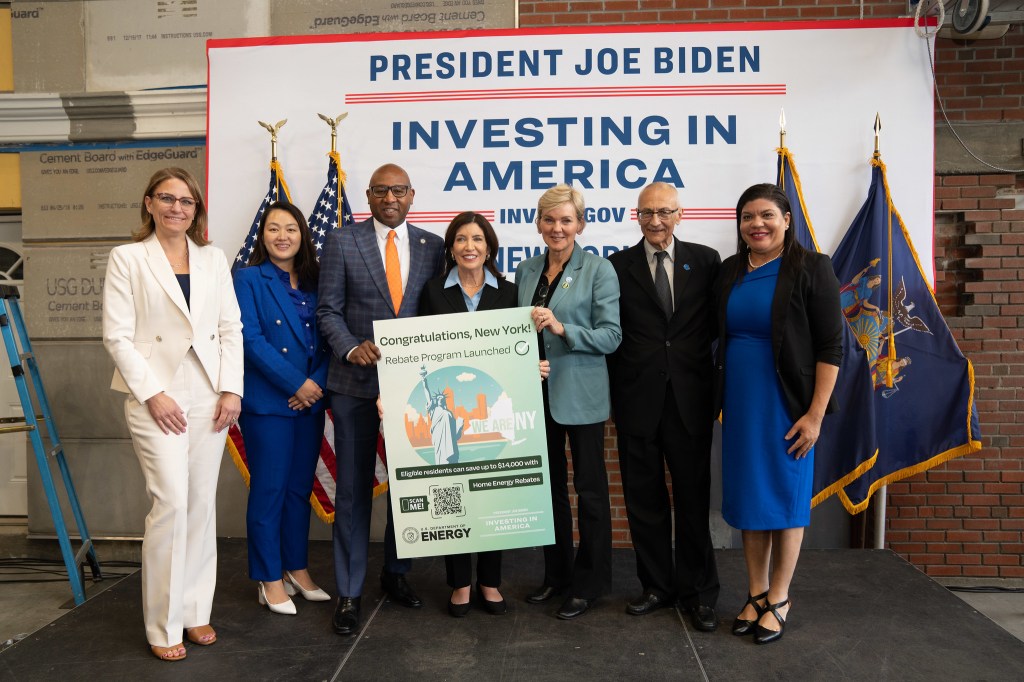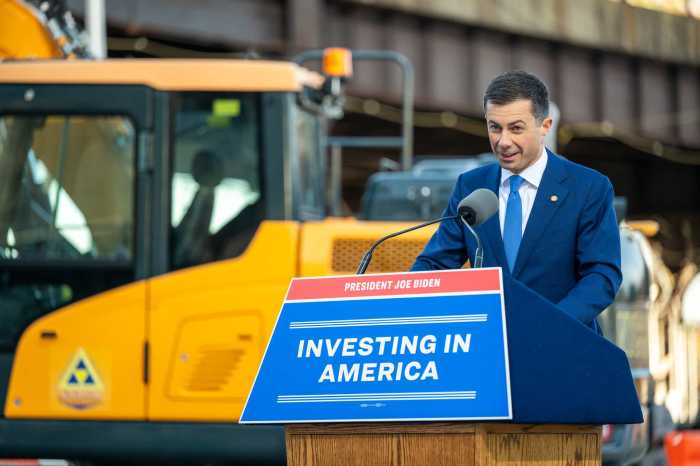The Biden administration has awarded an eye-popping $6.88 billion to build new train tunnels under the Hudson River between New York and New Jersey, with plans to start constructing the new tubes next summer and finally get the ball rolling on the long-gestating Gateway project.
The funds from the Federal Transit Administration’s (FTA) Capital Investment Grants program, announced Thursday by Senate Majority Leader Chuck Schumer, constitute the federal government’s largest-ever grant for a transit project, and the largest transportation grant ever awarded in New York State.
But the historically large funding announcement is befitting a project like Gateway, which Schumer has long considered his pet project and on Thursday described as the biggest and most important infrastructure project in America.
“Gateway is the most consequential infrastructure project in all of America,” Schumer said at a press conference overlooking the Long Island Rail Road’s West Side Yard in Manhattan. “And everyone across the country agrees: if the tunnels that cross the Hudson lapse or are unusable, our whole economy goes into turmoil.”
“Every day, 200,000 people pass through the North River Tunnel, and a closure affects not just the entire Northeast Corridor, but the entire country,” said Transportation Secretary Pete Buttigieg in a statement. “Today, we are proud to announce that the Hudson River Tunnel project is entering the Engineering phase, moving us a huge step closer to finally revitalizing and expanding this century-old piece of American infrastructure.”
The grant will go towards constructing new underwater tunnels under the Hudson for Amtrak and New Jersey Transit, to supplement the existing 110-year-old tunnels that were heavily damaged during Hurricane Sandy in 2012. Schumer said once construction is underway, completion can be expected in about six or seven years.
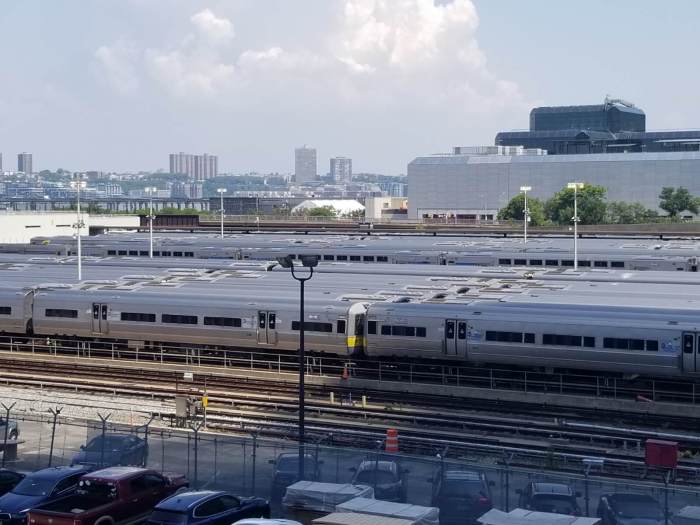
Once the new tunnels are finished, Amtrak — which owns the tubes — can shut down the old ones to refurbish them and address lingering storm-related damage. When the old tunnels are refurbished, train capacity crossing the Hudson would have been doubled, though funding for that portion of the project has not yet been secured.
The total cost of the tunnel project is pegged at $17.18 billion, according to the FTA, with the feds paying 50% and the states of New York and New Jersey agreeing to split the other half.
But the senator conceded that the project could easily see cost overruns, mainly due to the extensive delays and false starts that have long plagued the venture under previous administrations at the state and federal levels. To address that, the Gateway Development Commission — the bi-state public authority facilitating the program — is expected to be allocated an additional $3.8 billion, Schumer said.
In 2009, during his tenure as New Jersey governor, Chris Christie — now running for the Republican presidential nomination — controversially canceled a similar project called Access to the Region’s Core, or ARC, even after hundreds of millions of dollars had already been spent.
Amtrak announced Gateway in 2011, and the Obama administration sought to create a cost-sharing agreement between the feds and the states of New York and New Jersey, but momentum stalled during the Trump administration, which was hesitant to commit federal funding to what it called a local project.
The glimmers of hope have returned since Joe Biden took the White House, Schumer argued, especially after the passage of the president’s Bipartisan Infrastructure Law, which allocated tens of billions of dollars to transit projects.
But with Biden up for a tough reelection fight next year, Schumer — Washington’s most powerful Democrat — is scrambling to shore up funding and break ground quickly to prevent the project from once again becoming a political football that never gets built.
“We have to do this quickly, because these are 100-year-old tunnels…and they don’t have much time left,” said Schumer. “We’re rushing to get money now so we can get it under a friendly administration.”
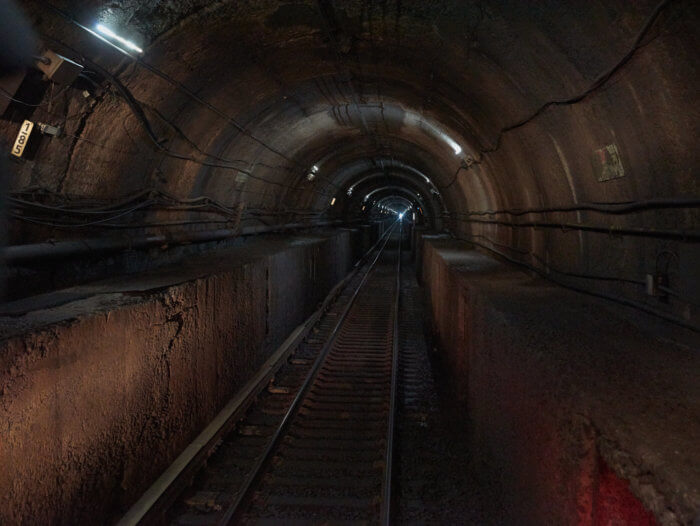
Like much of the city, the century-old tunnels were flooded with seawater during Hurricane Sandy, heavily damaging its concrete bench walls and electrical wires powering trains.
The Northeast Corridor between Boston and Washington D.C. is by far the busiest train line in Amtrak’s portfolio; coupled with New Jersey Transit traffic, the existing tunnels have reached their maximum capacity for train crossings, even as transit ridership remains below pre-pandemic baselines.
The Sandy damage has given way to cascading failures in the tunnels in the years since, causing delays and headaches for the over 200,000 commuters who travel through it each weekday, on over 400 trains.
The new tunnels are just one part of the larger Gateway project, which also includes building new bridges and tunnels within New Jersey and refurbishing the old tunnels. Earlier this year, Biden visited Hudson Yards to announce $292 million in funding to finish concrete casing under the west side of Manhattan, which will surround tracks leading between Penn Station and the new tunnels. The feds have also awarded funding for the reconstruction of the Tonnelle Avenue and Portal North bridges in New Jersey.
All Gateway-related projects are not expected to be completed until the mid-to-late-2030s, but to Schumer, Thursday’s grant represents a new attitude from Washington towards the project.
“All the problems we have seen in the past are over,” said Schumer. “With today’s new dollars, Gateway’s future is assured.”
Read more: Madison Square Garden’s Permit Renewal Secures Major Event Hub Status



